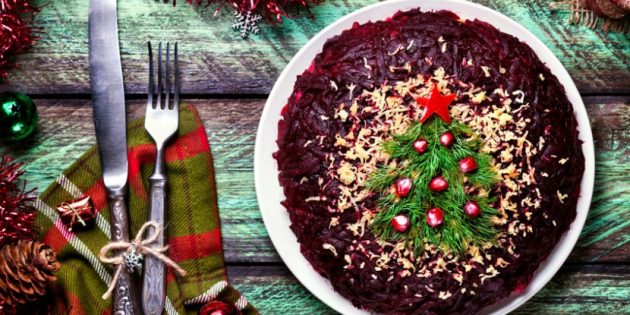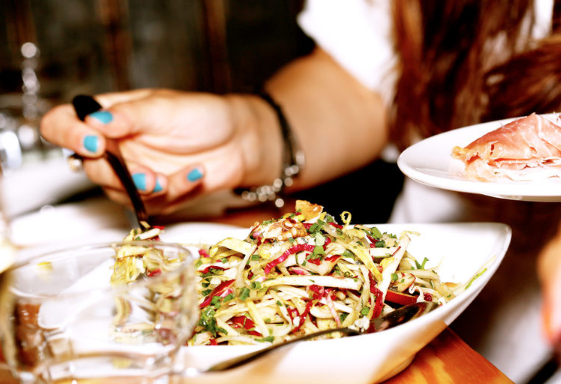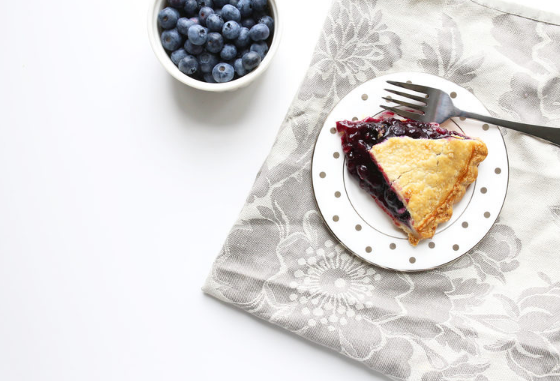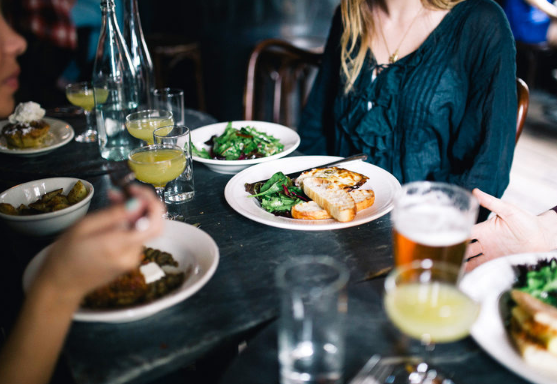With the holidays, many occasions of eating come during the festive celebration. Office get-togethers, school celebrations, home parties, and family merriments are common, each including a host of food selections. For some of us, eating during the celebrations will mean our bodies respond with an increase in bloating.
Avoiding holiday weight gain may sound as feasible as Santa fitting down billions of chimneys on Christmas Eve, but we promise there are logical strategies to stay on track. Many of us experience weight gain during the festive winter months, but packing on a few pounds in December is far from inevitable.
Don’t get us wrong: The holiday season is all about celebrating, togetherness, and indulging – in moderation. So pass the eggnog and let’s tackle navigating holiday food spreads, hectic schedules, and sidelined gym routines.
Here are 20 ways to enjoy the celebration, keep the bloating away and avoid weight gain:
1. Eat before drinking and celebrating
Skipping breakfast or lunch in order to “save your appetite” probably isn’t the best weight-maintenance tactic. While the jury’s still out on how important breakfast truly is, not eating until the afternoon may lead to binging later on (read: four slices of pumpkin pie). Our advice? Stick to a reasonably sized breakfast with plenty of protein, which will keep you fuller longer and temper the urge to stuff your face later.
2. Use smaller plates
Plate sizes have expanded significantly over the years. Whenever possible, choose the smaller salad plate (8-10 inches) instead of a tray-like one (12 inches or more). Using smaller plates can actually make us feel fuller with less food. The brain associates a big white space on the plate with less food (and smaller plates generally require smaller portions).
3. Eat and Chew slowly
Eating slowly may not be easy when appetizer options are endless, but it pays off to pace yourself. Chewing foods completely is important for the satisfaction as well as for digestion. Saliva holds digestive enzymes which help to break down starches and begin the digestive process (even before the food enters the stomach). Chewing foods longer also allows the brain time to receive a signal from the stomach that it is “full.” This signal process takes approximately twenty minutes. The quicker we eat, the less time the body has to register fullness. So slow down and take a second to savor each bite of baked brie or scoop of spiced nuts.
4. Be Sensitive to Full
When the stomach approaches full, the taste of food changes. Be sensitive to this change as well as the “politely full feeling” which occurs in the stomach during festive celebrations. It is always possible to take a few holiday goodies with you for a later time of enjoyment.
5. Wait before grabbing seconds
Like we’ve mentioned, the quicker we eat a meal, the less time we give our bodies to register fullness. Since it takes about 20 minutes for the brain to get the message that dinner’s been served, it’s best to go for a walk or chat with friends before dishing up seconds.
Not only does alcohol add unnecessary calories to your diet, but getting boozy has another effect on us, too. Drinking too much in the presence of champagne, eggnog, wine, and beer can make us lose our inhibitions around food and start eating irresponsibly. Take it easy with the bubbly before you start saying things like, “Eh, what’s one more cookie?”
6. Take it easy on the white stuff
Simple carbs are often the white stuff—white bread and refined sugars (like those in soda and candy). These foods provide energy, but often lack the same nutrients as complex carbohydrates (which are found in starchy foods, such as legumes, potatos, corn, and whole grains). While some simple carbs can be good for us (a.k.a the kind found in fruit and low fat dairy products), in general, the body breaks down simple carbs more quickly than the complex kind, which creates a spike in blood sugar (insulin) that can leave us feeling hungrier, faster. Stick to whole grains (whole-grain bread, brown rice, or quinoa) and stay full on healthy proteins (like we mentioned previously).
7. Beware of booze
Not only does alcohol add unnecessary calories to your diet, but getting boozy has another effect on us, too. Drinking too much in the presence of champagne, eggnog, wine, and beer can make us lose our inhibitions around food and start eating irresponsibly. Take it easy with the bubbly before you start saying things like, “Eh, what’s one more cookie?”
8. Sneak in the veggies, especially fiber rich ones
Munching on vegetables has long been recognized as a way to protect against obesity. When selecting foods at holiday celebrations, make your focus on fiber-rich veggies. The natural fiber will help the foods move through the digestive tract more easily. When filling your plate, place more green vegetables of choice and save a small amount of room for the holiday “goodies.”Mix puréed veggies (like pumpkin) into baked goods or casseroles, or sneak them into pasta or potato dishes. Adding veggies increases fiber, which helps make us fuller.
9. Daily probiotics
Include probiotic supplements daily. This will help aid digestive functions by clearing the intestinal walls, breaking down foods, eliminating wastes, and increasing the absorption of nutrients. Choose a high-quality supplement with the following strains: L. Acidophilus, B. Longum B. Lactis, and L. Rhamnosus.
10. Make room for (healthy) fats
Cutting butter and oil can slash calories (and it’s easy to swap in foods like applesauce, avocado, banana, or flax into holiday baked goods!), but not all fats are bad fats. We need fat in our diets to provide energy and absorb the fat-soluble vitamins A, D, E, and K, plus fat helps us feel full.
Get healthy monounsaturated and polyunsaturated fats from avocadoes (hello, guacamole), nuts, and olive oil (in baked goods, on veggies, or in homemade dressings). Bonus: Combining fat with fiber- like dipping veggies in guacamole – has been shown to increase fat’s power to make us feel full.
11. Ditch added sugar
Holiday cookies, cakes, and pies are nothing short of tempting, but all that added sugar may increase the risk for cardiovascular disease and obesity. Stick to sugar that comes in its natural form (fruits, veggies, and whole grains) and try small tastes of the desserts you’re truly craving rather than loading up a full plate of bland cookies.
12. Just say no
Though your relatives may encourage overeating by shoving seconds onto a cleaned plate, it’s OK to respectfully decline. “I’m full” or “I’m taking a break” should be enough for friends and family members to back off (and give you time to decide if you’d really like more).
13. Cave in to cravings
Finally, a suggestion we can all get behind. It’s smart to acknowledge a few cravings instead of pushing them away completely. Caving to a craving – as long as it’s in moderation- can curb the desire to go at it like a kid in a candy store.
Forbidding a specific food or food group during the holiday season may only make it more attractive. Still want more of that apple pie after a couple of bites? Try thinking of your favorite holiday activity, like opening presents, watching Christmas movies, or playing in the snow. Research shows that daydreaming about pleasant activities or distracting yourself with just about any activity can reduce the intensity of food cravings.
14. Gulp H2O
Drinking water helps people feel full, and as a result consume fewer calories. Rather than guzzling calorie- and sugar-laden sodas and juices (which are associated with increased body fat and blood pressure) treat yourself to a glass of wine with dinner and keep your allegiance to water for the rest of the day. Allow yourself small amounts of egg nog and peppermint coffee (or other refreshments), but keep the focus on drinking plenty of water.
Drinking water will help your digestive system to work better. The universal rule is to drink half of your current weight in ounces of water each day. So, if your body weight is 120 pounds, then your goal will be to drink at least 60 ounces of water daily.
15. Enjoy Herbal Teas
Including herbal teas in the diet can help to calm the stomach and deter bloating. Choosing herbal teas with peppermint, ginger, chamomile, chai, lavender, and green tea are definitely beneficial during this time of the year.
16. Turn off the tube
Though turning off the TV during any football game or family movie might feel like a sin, eating while watching television is linked to poor food choices and overeating. Plus, getting sucked into It’s a Wonderful Life or Elf may bring on mindless eating, since it can be easy to lose track of just how many chocolates or candies you’ve had. And it’s not just the mindlessness of watching television that’ll get us. Commercials for unhealthy foods and drinks may increase our desire for low-nutrient junk, fast food, and sugary beverages.
17. Sleep smart
Though there’s likely no stopping the urge to wake up early on Christmas morning, getting enough sleep can help shave off some pounds, since sleep loss is linked to changes in appetite. Getting enough sleep has also been associated with less weight gain. Practice good sleep hygiene, like turning off electronics in the bedroom and avoiding high-fat foods at night.
18. De-stress
The holiday season is full of cheer, but it can also be stressful keeping up with family get-togethers and paying for all those gifts. Unfortunately, a lot of stress can trigger increased eating and cravings, especially for sugary carbohydrates. If family time (or being away from family during the holidays) has you feeling overwhelmed, try out one of these ways to reduce stress before downing hot chocolate and cookies.
19. Move it & Lose it
Stay Active – During the holidays, everyone’s schedules can become full of festive gatherings, holiday outings, and things to do. Remember, in order to manage holiday weight gain – it helps to stay active. Include time to continue your active routine, even if the segments are smaller amounts of time.
A simple phrase for losing weight is to move more and eat less. The secret here – like we said before – is that moving doesn’t just mean hitting the track or going to the gym. Make a conscious decision to get more steps into the day by taking the stairs or parking the car far away from the grocery store entrance. Before curling up around the fire, round up family members for a hike or snowshoeing session. Walking is a great choice any time of year and can be done for even short fifteen minute segments. Movement helps increase digestion and helps to manage weight gain.
20. Serving Others
Another wonderful way to help the community during the holidays is to volunteer to serve others – through civic dinners, helping at food banks, or purchasing small food items for those who are sheltered. Remember, it is not all about keeping the “enjoyment” to yourself.
Originally published December 2013. Updated November 2015.
Works Cited
A prospective study of holiday weight gain. Yanovski JA, Yanovski SZ, Sovik KN. The New England journal of medicine, 2000, Mar.;342(12):0028-4793. Weight and body composition change over a six-week holiday period. Wagner DR, Larson JN, Wengreen H. Eating and weight disorders : EWD, 2012, Oct.;17(1):1590-1262.















